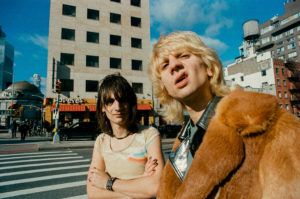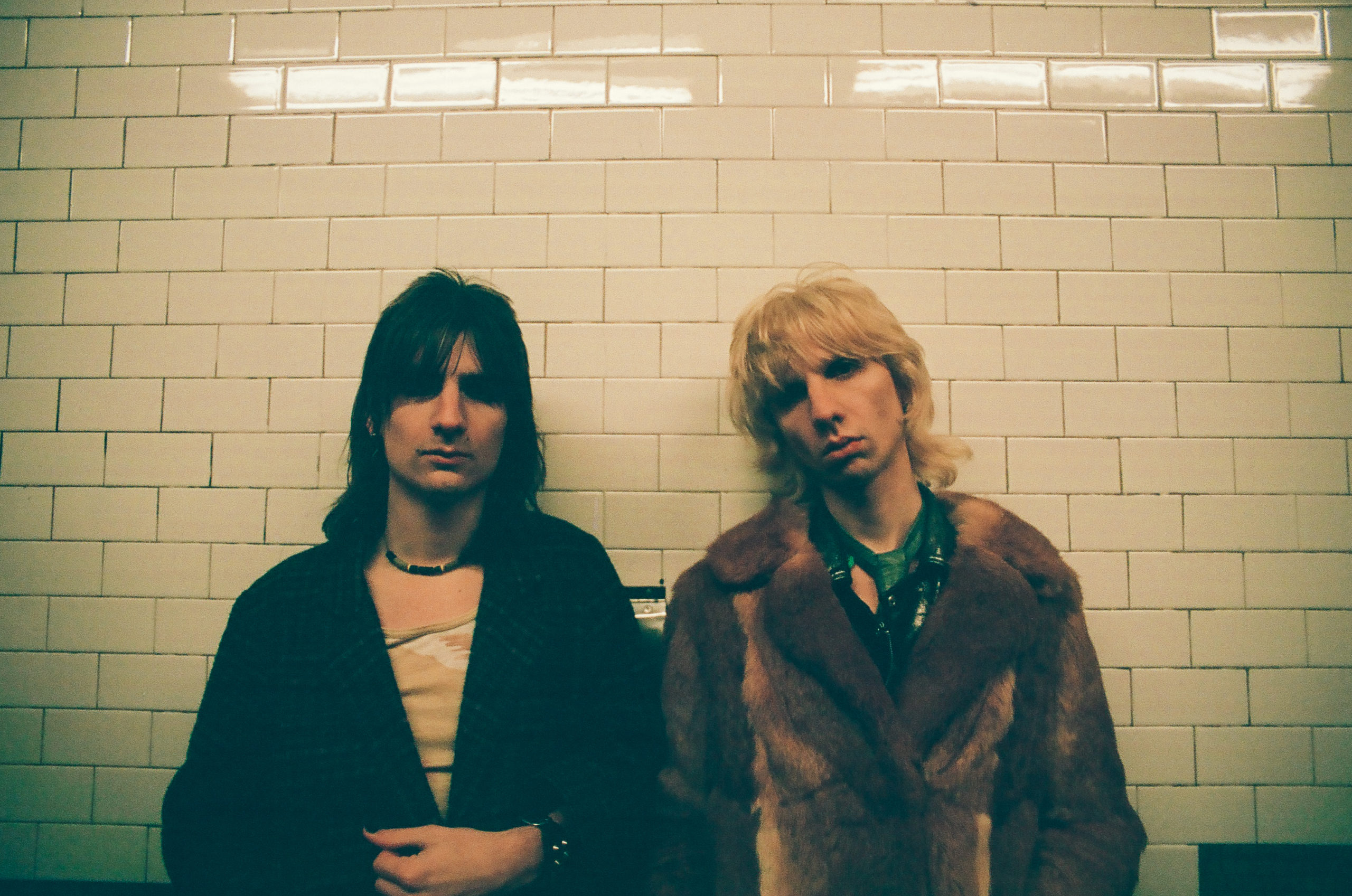“I have always found it difficult to wrangle my imagination into one idea,” says Michael D’Addario of The Lemon Twigs. “But at times I’ve felt like it’s necessary, because if Brian and I really let loose, our tastes are so broad that our music will be unidentifiable.”
Indeed, it’s almost frightening to consider what might happen if Michael and his older brother Brian ever “really let loose,” given that The Lemon Twigs’ first two albums (2016’s Do Hollywood and 2018’s Go to School) were both loaded to bursting with freakishly encyclopedic arrays of classic ’70s pop moves and theatrical flourishes. Songs for the General Public, the duo’s forthcoming third album, is possibly even broader in its musical scope—“Moon,” their latest single, could have fit comfortably on Meatloaf’s Bat Out of Hell, while “Hell on Wheels” sounds like Mott the Hoople with Ian Hunter really laying into a Bob Dylan imitation, “Live in Favor of Tomorrow” could be a Move outtake, and “Leather Together” is a delightfully sleazy blast of lo-fi glam-punk—yet the songs are also more immediate and accessible than anything they’ve done before.
“We had so many songs,” says Brian, who shares a home studio with his brother at their parents’ house in Long Island, New York. “I think we worked on sixty songs here at the house, and I think they’re all eventually going to come out on various records. But at some point, we realized, ‘OK, we need to focus this in some way.’ We knew we wanted this one to have the most ‘instant’ songs, musically, and the most direct songs, lyrically.”
With the D’Addarios handling the bulk of the vocal, instrumental, mixing and production duties, Songs for the General Public was further buffed and refined at Sonora Recorders in LA (where Foxygen’s Jonathan Rado contributed additional production) and New York’s Electric Lady Studios. Originally due out this month, the album’s release was pushed back to August 21 because of the COVID-19 pandemic; rather than fret about this change in plans, the D’Addarios simply used their unexpected downtime to release The Lemon Twigs LIVE on Bandcamp, with all proceeds benefiting Coalition for the Homeless. Recorded during the Go to School tour, LIVE captures a rawer, wilder side of The Lemon Twigs, proving that they are far more than just studio-bound pop wizards. (Not that there’s anything wrong with that.)
We spoke with Brian and Michael about both new records, the differences in their approach to songwriting, and the sonic secrets at the heart of their ’70s obsession.
Your last album, Go to School, was a full-fledged concept album. Was there any operative concept behind Songs for the General Public?
Brian: Not really. Once we got to Sonora, that’s when it started to be obvious which songs were going to go on this record. Now, when I look at all of the songs on this album, they all seem to be semi-related lyrically. A lot of them have to do with personal relationships—not even our own, necessarily, but they’re examinations of different people’s follies, and how they fall short in a relationship or any sort of two-person thing. I think “Moon” would be an outlier in that, though; it deals with getting out of your town. I think that would be the only one that doesn’t concern two people.
Michael: The concept is in the title. We think it’s funny, but it’s also true. Stylistically, the songs fit together, but everything on this has a hook, with the possible exception of the last song, “Ashamed,” which is like “Auld Lang Syne” or something. But even “Auld Lang Syne” is pretty popular…and by the time it gets to that song, you’re a little bit exhausted by all of those choruses, all of that sugar! [Laughs.]
Can you define the difference between a “Brian song” and a “Michael song”?
Brian: It’s sort of getting closer every record. But if you’re going to hear a really good rock and roll song, that’s usually not going to be my song. My songs usually have some sort of backbone to it that’s leaning on the melodic, chord-oriented side of things. I think lyrically, I like to find what I’m talking about through some sort of unconscious process, rather than it being more of an emotional thing of getting a feeling down. And I think Michael sort of taught me a lot on this record about how, when I am writing this way, to make it clear enough so that I’m really communicating.
“We’re always listening to ’70s records and going, ‘That sounds great, don’t you think? We should get that thing that they were using,’ or, ‘We should go and record where they recorded this.’” — Michael
Michael: Brian’s really obsessed with getting an intricate melody happening that probably nobody else in the world could write. I am very into melody, but I just don’t mind having a melody that I think anybody else could write. I really don’t; if I put myself under that kind of scrutiny, I wouldn’t have been able to write “Hell on Wheels.” I think letting yourself go like that can really be beneficial. But I think Brian does let loose a little bit in his songs on this album, and it’s cool to hear that.
Brian: When I think about a song like “Moon,” “Hell On Wheels,” or “Fight,” all of which are Michael songs, there’s really nothing I could have contributed to them other than instrumental parts. And a lot of the time, if I were to contribute something, it would be throwing in a chord that would take away from the simplicity that is really necessary for some of those songs. You don’t need any jazzy chords in “Leather Together.”
Can you pinpoint any new influences that have crept into your music since the last album?
Brian: Usually I just get wrapped up in a particular album for a period of time, and then I wind up getting influenced by it, like, a year later. I don’t know if it really translates on this record, but I was obsessed with Cat Stevens for a long time—Catch Bull at Four in particular. “Sitting,” the first song on that album, I would listen to that over and over and over. Phil Ochs was another big person for me that I got into after Go to School. Because of them, I think I started paying a little more attention to what I was singing in songs.

Michael: I wasn’t really listening to anything different than what I’m usually listening to, though I really loved that compilation that came out of Smokey, the S&M leather band [How Far Will You Go? The S&M Recordings 1973-1981]. Lyrically, I really liked some of those songs. They were really touchstones for certain songs on this record—I wonder if you’d be able to tell? [Laughs.] Mostly, I really just wanted this record to be fun.
There’s obviously a big ’70s pop vibe to what you guys do. Both of you were born in the late ’90s, so what is it about that era that really resonates for you?
Brian: I think, more than anything, it’s the sounds of the studios in that era. That is the thing that I will always try to emulate, because I think it’s just the best period of recorded pop music. And it seems like the one that people try to emulate the most, but it’s the most difficult; there were so many factors in what made those recordings sound the way they did, and people generally aren’t willing to go the full extent to really emulate them. Now, I guess, it’s more in fashion to go for a more ’80s thing; but for rock music, I think the ’70s thing just ends up being our taste, sonically. There are things I love from the ’90s, but those end up being more home-recorded stuff that probably wouldn’t fit the aesthetic of this record, or the Steve Albini sound, which I was really into when I was a teenager. But I haven’t really made the kind of music that fits something like that.
Michael: I’m so non-discriminatory about music, as long as it’s melodically interesting in any way, that I don’t really think of our music like that. But we’re always listening to ’70s records and going, “That sounds great, don’t you think? We should get that thing that they were using,” or, “We should go and record where they recorded this.” “Live in Favor of Tomorrow” is very ’70s, sonically, but it’s a very ’60s song. And if you go down the track list and analyze the songs that way, that theory starts to fall apart a little bit. I mean, “Moon—I don’t even know what era that sounds like it’s from. Melodically, that one’s more ’70s, but sonically I was really going for that Lou Reed record, Magic and Loss; I love the way that record sounds, and it’s totally ’90s. And we also listen to a lot of ’30s and ’40s stuff, like Irving Berlin and songs from Marx Brothers movies. We’re all over the place.
“LIVE is cool to look back on, even though it was relatively recently. I don’t think we’ll ever be able to get that side of us across on a studio record; and when we do tour for this record, I think it will be a lot different than how we sounded on that tour.” — Brian
The Lemon Twigs LIVE album you released on Bandcamp reveals a side of you that’s much rawer than your studio records. Had you always intended to release those tapes?
Brian: I really wanted to release it when we first got off the road, but I don’t know if our label was that interested. But yeah, I’m happy with it. It was such a weird time after we released Go to School. I felt we should come off of an album like that by getting some string players together and trying to do this orchestral/theatrical thing. And Michael’s headspace was really not there; he wanted to do the opposite of that album, practically. And we had these musicians with us that were so great, who came from the jazz world. It ended up being a lot of jamming, which I never expected to do in my life—a lot more soloing than I ever thought I would want to do. [Laughs.] It’s cool to look back on, even though it was relatively recently. I don’t think we’ll ever be able to get that side of us across on a studio record; and when we do tour for this record, I think it will be a lot different than how we sounded on that tour.
Michael: We recorded it on a little cassette machine; we didn’t know if we were going to put it out with our label or if we’d slip it out like a bootleg, but we wanted to make it something interesting, not just put out a live album that’s really boring. The live albums that are cool are the ones where they completely transform the songs, or the ones where they just talk—or maybe they do the songs really intimately. And this gave us the opportunity to document that period. It was very intense to do that kind of stuff every night; it was hard work, and I really wanted a snapshot of it. Because I don’t know if I always want to be that intense, you know what I mean? FL









